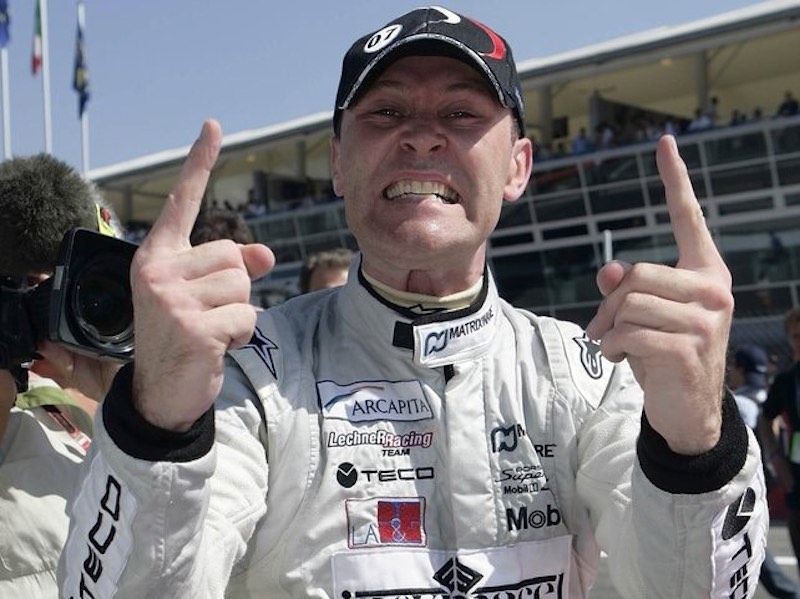IT’S almost ten years now since the call came to hand Damien Faulkner a unique opportunity.
Raed Abuzinadh, a racing driver and an architect, was aiding the formation of a motor racing team in Saudi Arabia and enlisted the help of some of the world’s leaders in the sport.
Picture: Damien Faulkner celebrates after winning a Porsche Super Cup race at Monza in 2007.
It was on Abuzinadh’s recommendation that Moville man Faulkner – well regarded in motor racing – was hired.
The Saudi Falcons team was the brainchild of Faisal Bin Laden, whose father, Saad, is a half-brother of Osama Bin Laden, the former Al-Qaeda leader who plotted the the 9/11 attacks on America.
Faulkner lived in a compound in Riyadh, the Saudi Arabian capital.
“I was living with the Bin Laden family and working for them,” Faulkner tells Donegal Daily/Donegal Sport Hub.
“Myself and a colleague from Holland were coaching them and coaching their team.
“We created a team and ran some local drivers in Saudi Arabia. The team was called Saudi Falcons and it’s still going to this day.
“I lived there for four or five years.”
Faulkner’s base was in the Riyadh compound alongside Saad, one of the leading heirs in the Bin Laden family.
“In all the time I was there, I didn’t see much unrest,” Faulkner adds.
“There was nothing to worry about really. Motor racing is a small world and a small bubble.
“We ran a team and at times, to get bits and pieces fixed or to pick up things, we had to go deep into Riyadh.
“I was racing at that stage for 20 years. There was no focus on anything other than racing.
“It wasn’t as if we were going to Saudi Arabis for a social life and if I came home, I was just working for a racing team rather than the man who was living with the Bin Laden family.
“I worked for Saad’s sons. They wanted us because of our speciality. Saudi Arabia was an amazing experience. The cars and the wealth were just mind boggling. I had a great time in Saudi Arabia. It was a great experience. It was fascinating.”
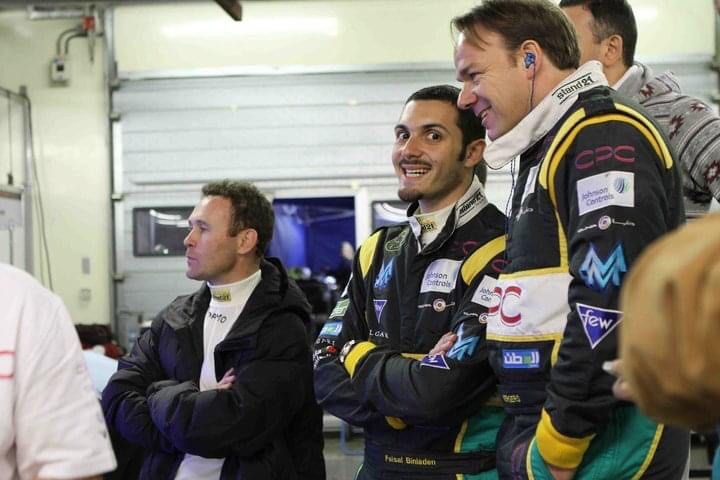
Damien Faulkner (left) with Faisal Bin Laden in Saudi Arabia
One day does stick in Faulkner’s mind. February 14, 2011, or ‘Day Of Rage’ as it became known.
Some 6,000 people took part in protests in Bahrain, where 55 marches were held at 25 locations. Security forces clashes with protestors and the air turned black in some places.
“There was a warning put out basically not to be walking in the streets or be seen in public places,” Faulkner says.
“The Government had said if they saw people on the streets, they’d take it as a protest and ‘be dealt with’.
“It was clear what that meant. I flew home at 8am.”
Faulkner, the 2000 Formula Palmer Audi champion, had forged a name for himself and was known in the Middle East, finishing on the podium three times in Porsche Super Cup races in Bahrain, including wins in 2007 and 2008.
He was an obvious choice for the new Falcons team. The Saudis purchased a car from Faulkner, who has recently bought it back and restored it.
The Saudi Binladin Group renovated mosques in Mecca and Medina. Not long after Faulkner’s arrival, the group signed a $1.23 billion agreement to construct the Jeddah Tower – the tallest building in world.
From the shores of Lough Foyle, Faulkner was mixing in a new world now.
He got to know Abdulaziz bin Tirki Al Saud, who was appointed as Saudi Arabia’s Minister for Sport in January. He is the great grandson of Ibn Saud – the first king of Saudi Arabia.
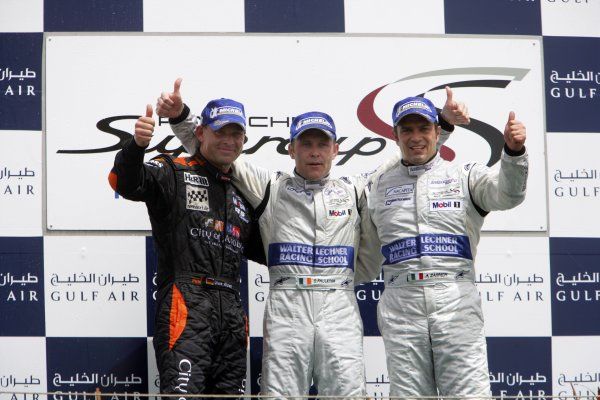
Damien Faulkner (1st position), Uwe Alzen (2nd position) and Alessandro Zampedri (3rd position) at the Bahrain International in 2007
****
IT all began in a small garage in Moville.
His father was a Mitsubishi dealer for 30 years. Faulkner’s of Moville was known throughout the Inishowen peninsula.
Little did anyone know, the family name would become known across the world.
“I inherently had an interest in cars,” Damien says now.
“My parents had a car dealership so there was an interest in cars, but there was no history of racing or competing.
“Racing is the poor relation to rallying in Donegal, but my folks weren’t even into rallying. I just had a sort of inherent interest in motor sport.”
His interest peaked watching the Grand Prix on television and he aspired to be Ayrton Senna.
As he got older, he began to wonder.
“I dreamed and dreamed big,” he says.
“I was really ambitious. I sat down and wanted to work it out: ‘How can I get involved? How can I win, climb the ladder and prevail?’
“If there was a way of doing a study on it, it would have came up negative. ‘Leave it, don’t touch it, walk away. Get the football out again!’
“I didn’t. I kept at it, with the help of a lot of people.”
His first car was a nine-year-old British-built Reynard.
He competed six times in his first season, winning the sixth race, a Leinster Trophy race which happened to be televised on RTÉ.
“It was so far fetched back then that I was racing for a season before anyone knew,” he says.
“I didn’t tell anyone at home. There was no stopping me.
“My parents helped me so much. Without them, none of it would have happened. They were able to help me with funding.
“At the start, funding wasn’t that expensive. It was a challenge, but noting like what it is today.
“In a nutshell, really, it was as simple as buying a car, getting a licence and going racing to Mondello Park.”
He won the Leinster Trophy the following year too and he was on a roll.
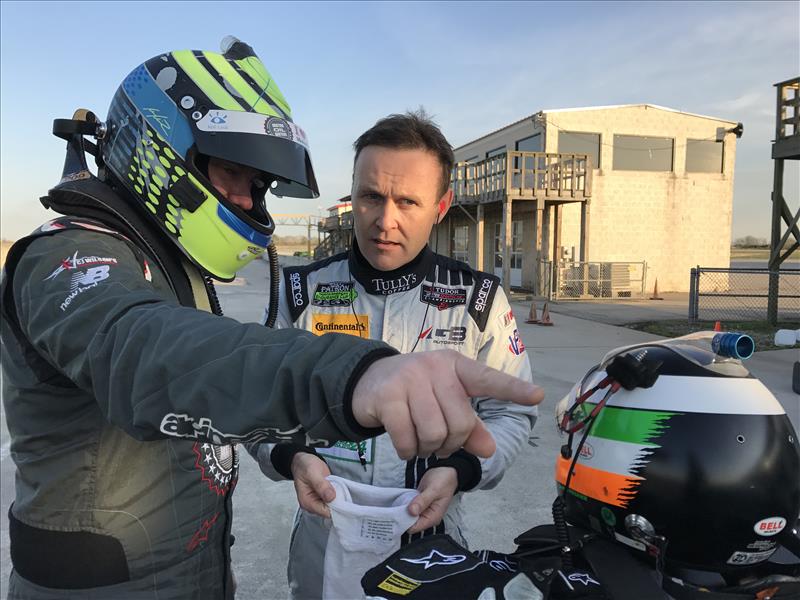
Damien Faulkner talks tactics with Marc Miller
****
THE 1995 Formula Vauxhall Junior Championships saw Faulkner make his professional debut and in the 1997 version he came third in the overall standings.
“You start with a dream, but you don’t know anything about what it entails when you get involved,” Faulkner – who had linked up with Belfast man Martin Donnellly – says.
“You get a rude awakening very quickly. You’re not even at a World Series level, but you have multiple nationalities competing and British motor racing was very competitive back then.
“I was against all of these people who have driven go-karts for 10-12 years and I was in my third season in 1997.
“I had a couple of bad races where some wee things happened and I’d lose confidence.
“It was a hard slog and there was many the time where I was at a track in the UK wondering: ‘Why am I even doing this?’
“Motorsport is very like general life only there are higher highs and lower lows. It would have crossed my mind and I’d have asked why I was doing it, but it never got to a stage where I was going to give up. It was just asking why, but also what had I to do to make myself better.
“Back then, sports psychology was as rare as a racing driver from Donegal!”
His third-place in the Vauxhall Junior Championship came as a big breakthrough for Faulkner, who won his second pro race – ‘by pure grit and determination’, as he puts it.
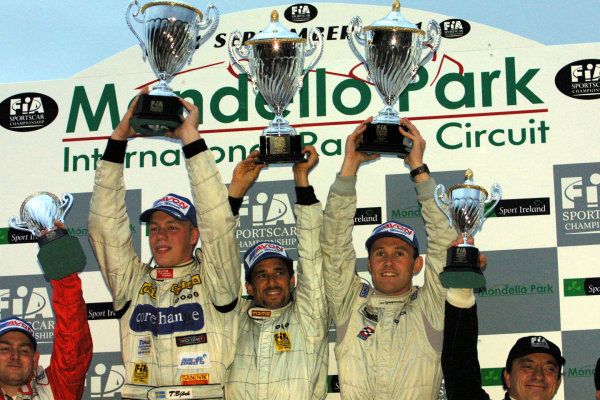
Damien Faulkner on the podium at the 2001 FIA Sportscar Championship in
Mondello Park
****
FAULKNER moved to Formula Palmer Audi in 1998, given a break by John Booth of Manor Motorsport and finished third in the British Formula Palmer Audi Championship in 1999.
“I had momentum then,” he says. I was winning races every year and was running at the front. I was noticed, but I was also being expected. I was being taken seriously by teams now.
“They all knew who I was. when it’s like that, it’s easier to get a deal for the following season and get onto the next rung of the ladder. It is just taking it step-by-step and bit-by-bit.
“The phone is your best tool. You have to go out and do it yourself. Nothing would happen if you were waiting on the phone to ring.
“At the end of the day, you have to go out and get it. I was wining races and was seen as a young, up-and-coming driver. I never had to pay the full price then for any season and there’s no doubt that helped.”
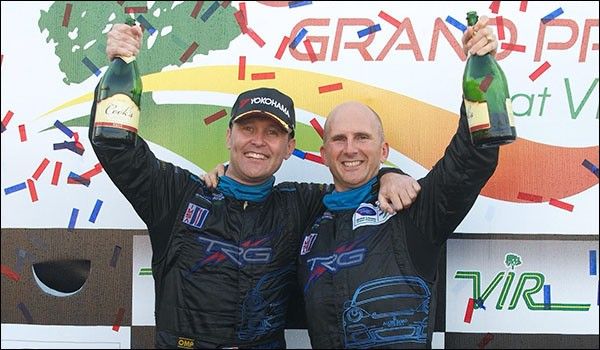
****
TWENTY years ago, Faulkner shot to stardom in the sport when he became the first Irish racing driver in over two decades to win a European Championship.
His third-placed finish at the 1999 British Championships earned a half-budget worth stg£70,000 for the 2000 season.
The 2000 series included races at Grand Prix venues like Spa, Silverstone, Magny Cours and Nurburgring.
Faulkner was 23 and was working closely with a personal trainer to keep sharp
“That is one of the toughest Championships,” he says.
“There was a lot of good talent in there.”
The moment came at Brands Hatch in the penultimate round of the Championship.
Faulkner knew he was in form contention in the series, but had no idea that a Championship win was imminent.
When he crossed the chequered flag at Brands Hatch, mechanic Kenny Kirwin raced over to him.
‘Congratulations, you’ve won the series…we’ve done it!’
Falkner was taken aback.
He says now: “I arrived at Brands Hatch and was so far removed from the permutations, I didn’t even know that it was possible to win. I told everyone around me that I didn’t want to know.
“There are people who get close, but their focus is on points. As i went on, my aim was breaking it down to beat everyone in each race and not think about the actual series. If I did a good enough job, the Championship would look after itself.
“I knew that I was leading and knew I was there or thereabouts. I just didn’t want to know how close in case I choked. The philosophy I had worked.
During that series, Faulkner won six races and he felt vindicated to have followed a dream as he stood atop the Brands Hatch podium.
He says: “I had enough belief and confidence to know how to bounce up from the set-backs.
“It’s very prestigious so it was very satisfying to win it. Everything went to plan.”
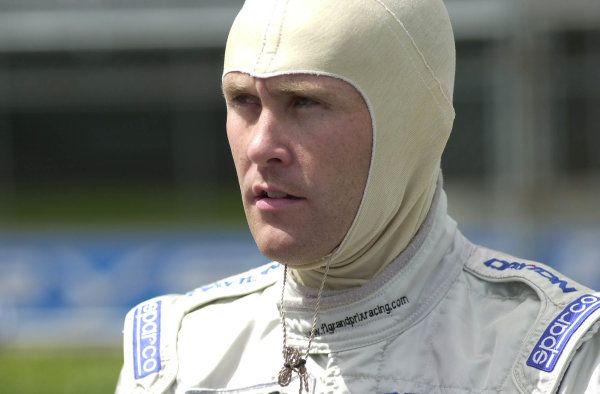
Damien Faulkner in 2001
****
AS PART of his prize, Faulkner got signed up by Dorricott Racing for the 2001 Indy Lights series.
He moved to America, taking trusted mechanic Kirwin with him to California.
They lived in an apartment in Bakersfield – the ‘armpit of California’ as it is known.
“It wasn’t pleasant, but the weather was good,” Faulkner says.
“I didn’t even have a car. I took my bike over and back. Those were the days when you could just rock up at the airport check-in desk with a bike and put it through. Every cent I had went to motor racing.
“Kenny and I lived in an apartment and we used to walk a mile to the supermarket for our groceries.
“At that stage, I had become – with the help of family, sponsors and supporters – self sustainable. I was able to raise money to go motor racing without asking my family for money.”
When he had lived in Dublin, Faulkner stayed in a house owned by Eddie Irvine, whose road Ferrari parked on the driveway while he also lived for a couple of years with award-winning photographer Michael Chester.
He says: “I had lived everywhere for free before i went to America. That was the first time I had to pay rent. We had to cover the essentials and it wasn’t essential that we had a car.
“The team was excellent for us. If we needed a vehicle we could borrow one. They were very well structured and very professional.”
America was different, but yet Faulkner hardly realised.
He says: “It was more of the same only with higher speeds and better weather.
“I was just totally immersed in racing. We didn’t go out socially. We just lived in the apartment and we only left to go training, speak to sponsors or go racing. Most of the time was spent at race tracks.”
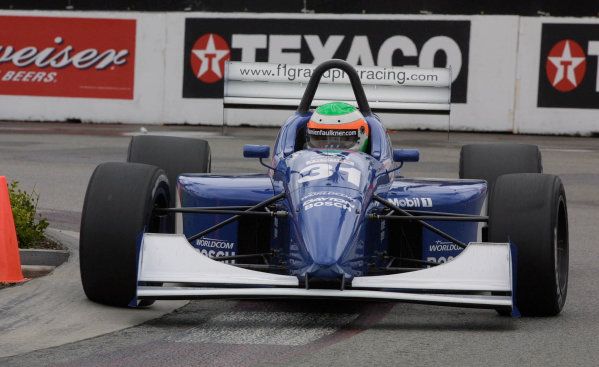
Damien Faulkner competing in 2001 in Long Beach
****
IN his third race in Indy Lights, Faulkner took victory at the Texas Motor Speedway.
It was April 2001 and he led the way for 65 of the 67 laps, beating Dublin-born Derek Higgins – racing for Mexpro Racing- into second.
“It was surreal,” Faulkner says.
“It was 200mph stuff on a super speedway. I got pole position and won the race. That was such a surreal moment. It was another box ticked.”
In June, Faulkner swept to a 16-second victory at Portland, Oregon.
He says: “That was just spectacular. It equalled a record in Indy Lights for a rookie. No rookie had won more than two races – and only a few had got to that level of winning two.”
A fortnight later, in Kansas, Faulkner was pipped by Kristian Kolby.
The margin was 0.001 of a second. A thousandth of a second.
“It was the closest finish in motor racing history,” Faulkner sighs.
“That would have elevated me to becoming the first guy to win three races in the first year.”
What might have been …
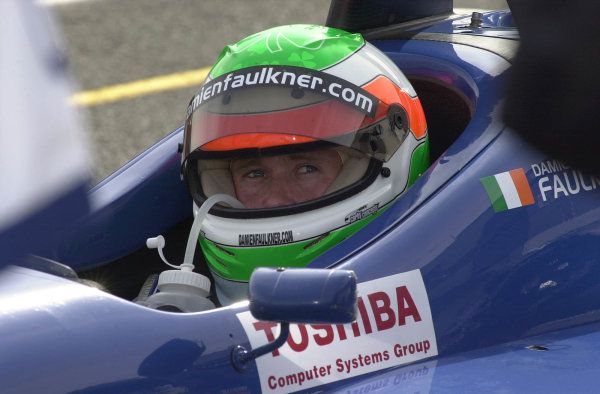
Damien Faulkner racing at Portland in 2001
****
FAULKNER had third-placed finishes in Toronto, Ohio and Atlanta, while clinching fourth spots at Illinois and Laguna Seca.
Heading into the final race of the Championship, at Fontana in November, Faulkner had things once more in the palms of his hands.
He was leading the Rookie Championship and the Oval Challenge, while he and Higgins were in front in the Nations Cup.
“In the last race at Fontana, I lost everything,” Faulkner remembers.
“It was just a disaster. I had a bad weekend and nothing gelled for me.
“Townsend Bell was my team-mate and a very accomplished driver. He had the Championship already sewn up.
“The team wouldn’t share info from the engineers. We asked for help and it didn’t come.
“That wasn’t Townsend’s fault, but the team could have handled that better and given me more support with Townsend already having it won.
“I had a terrible race anyway. I drove a very defensive race in desperation. I made a complete balls of it.
“It was just terrible. That was my worst day in the car.”
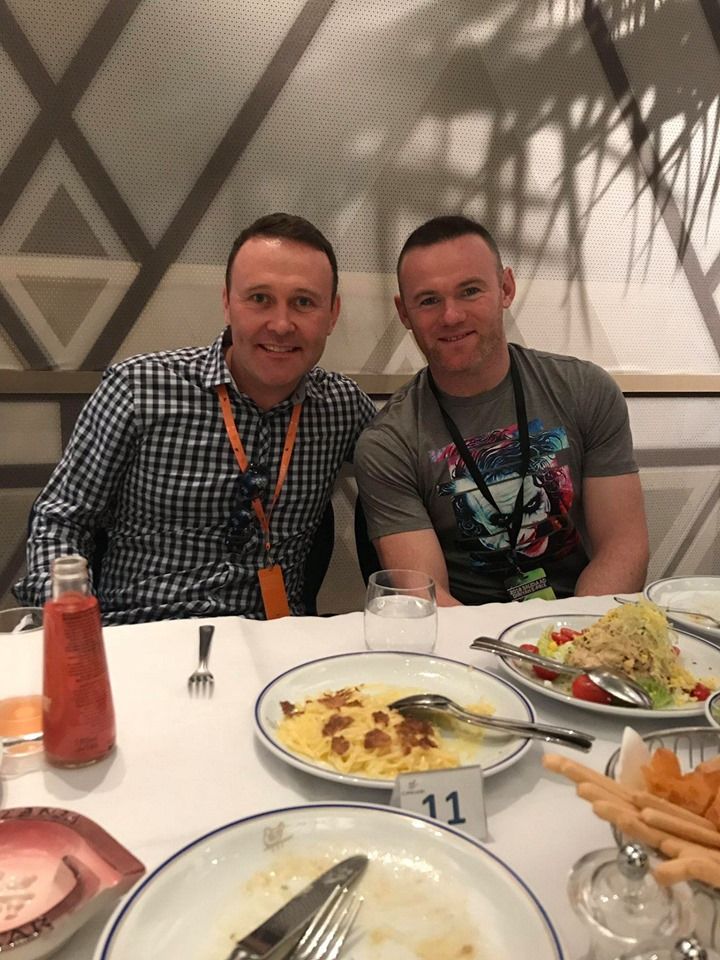
Damien Faulkner with Wayne Rooney at the 2018 Ad Diriyah ePrix
****
THAT evening, Faulkner’s world spiralled upside-down even further.
The stakes were higher than he could have imagines.
The budget needed was upwards on $800,000. Even with a half-budget deal – offered by Dorricott bosses – it meant that an entry would be nigh-on impossible.
“After 2001, they wanted me to stay, but I had exhausted all my avenues of revenue,” he says.
“I just couldn’t. I wouldn’t have been able to raise the money.
“I turned it down that day and that was the wrong thing to do.
“Still, I would have had to commit to raising a lot of finance. The conversation would have been longer and maybe not as forthright, but I couldn’t look myself in the eye and raise that finance. It was $800,000. They offered a half-price deal.”
He was to make the long trip across the Atlantic that winter with the future uncertain but with life-lasting memories.
He says: “It all came to a grinding halt after 2001, but competing in Indy Lights was a real highlight.
“That was almost as high up as you can get – just one step away from Indy Car or F1.”
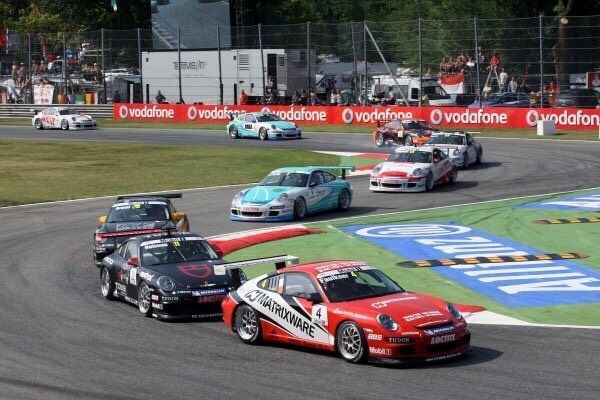
Damien Faulkner competing at Monza in 2009
****
FAULKNER guested in some invitational races, including a Super Cup event for Porsche at the British Grand Prix after his return to Europe, eager to make inroads again.
He won two races for Porsche at Mondello, which he entered on the recommendation of Fergus Brennan.
In 2005, he won a race at Donnington Park after signing up to race for Eddie McElhinney, a businessman who had strong connections to Donegal.
In the British Porsche Carrera Cup, Faulkner won the Championship in 2005 and 2006 racing for Team Parker
JG Kelly helped to sponsor him in 2007 to enter the Porsche Super Cup as he linked up with Walter Lechner Racing.
He came second in the Championship in 2007 and 2008, winning races at Monza, Hungaroring and two in Bahrain.
Faulkner says: “I almost won the Championship in my first year. No-one had ever did that.
“I finished second and in the second season we finished second again.
“In the third season, we had no testing and I had to drive a car that was raced the previous season. We didn’t have any success that year.”
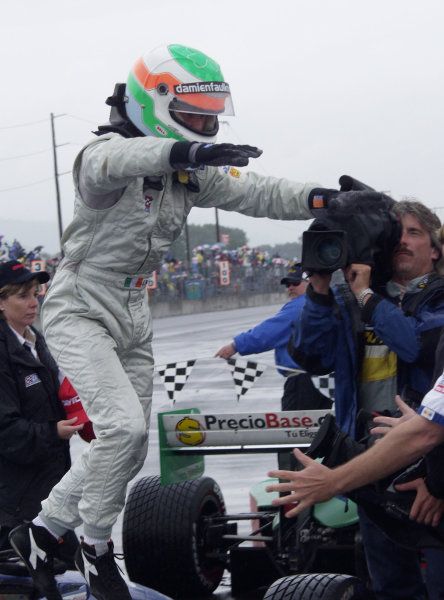
Joy for Damien Faulkner at Portland in 2001
****
WHILE based in Saudi Arabia, Faulkner flitted between the Middle East, Ireland and America, where he was still taking part in races.
In 2001, he won his first America Le Mans race – the Mobil 1 Twelve Hours of Sebring – becoming the first Irishman since Derek Daly to win his class in the race.
“I was racing again in the US, but at one stage I had 40 flights clocked up,” he says.
“It was nuts. I was coming from Saudi Arabia to Ireland, via London and then getting another two flights to America – and the same to get back to Saudi Arabia.”
Among Faulkner’s team-mates in the #81 Porsche for the 2014 United SportsCar Championship was Michael Avenatti, who is facing 40 years in America prison after being found guilty two months ago of three counts relating to the attempted extortion of Nike.
Avenatti is a famous lawyer who in 2018 filed a lawsuit on behalf of adult film actress Stormy Daniels – an American pornographic actress and stripper – seeking to invalidate a 2016 non-disclosure agreement regarding an alleged affair with Donald Trump in 2006
The team aspect of those endurance races, Faulkner found ‘frustrating’ although he ‘had a lovely time and earned good money’.
“It was good for my career, but there was literally nothing you could and at times races were out of your control,” he says.
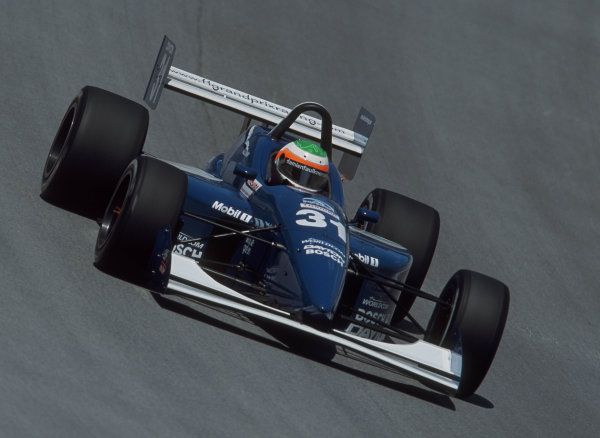
Damien Faulkner on his way to winning at Texas in 2001
****
HIS last year at the wheel was 2018, when he happened to meet up with Wayne Rooney at the Ad Diriyah ePrix.
Since stepping away from competing himself, he has been coaching and commentating for EuroSport.
Coaching for a UK-based Ferrari team, he still travels all over Europe and to the Middle East.
He lives between Dublin and Moville with his wife, Laura, and five-month old Ava Lily.
The coaching is certainly a different experience and challenge.
“You can do a lot with data and let them go by themselves,” he says. “We use videos as well, but sometimes I sit on. It’s a 600bhp Ferarri. It can feel like a rally car when you’re in their ear the whole time. That can be quite daunting as you’re going around the same track.
“They get so used to telling them what to do. If you momentarily get distracted or if you don’t tell them to break, they actually won’t break, even if they’re going into the same corner for the 60th time!”
With the Porsche rebuilt and ready in Dublin, who knows he might even get back behind the wheel.
“I just got it running before the lockdown,” he says. “I want to give my friends and family a spin. I never got that chance before.
“I’m very lucky to have such a car. It’s a very special car to me.”
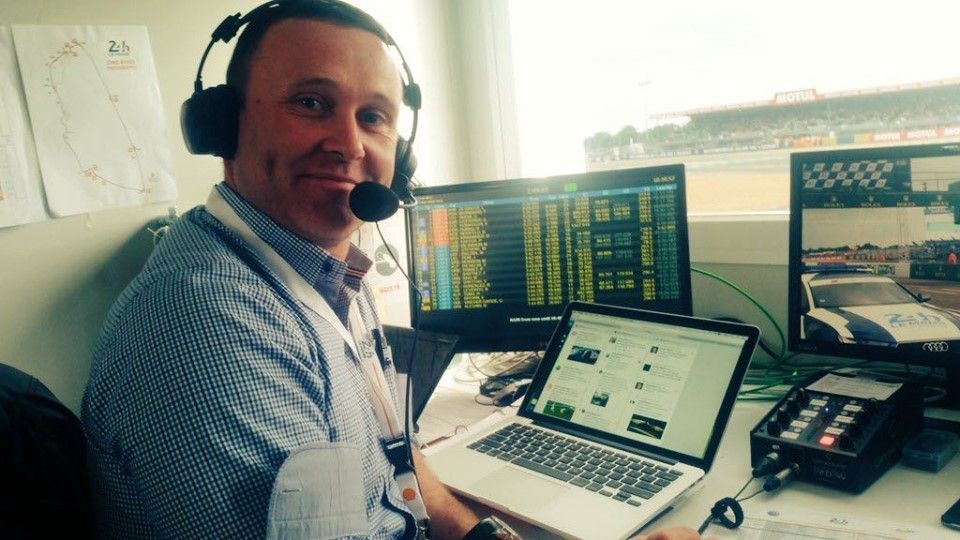
Damien Faulkner in the commentary box for EuroSport








